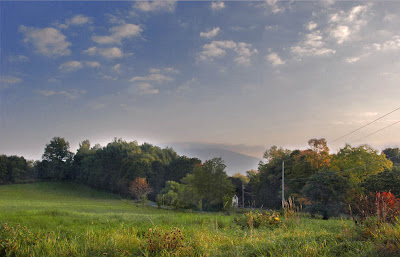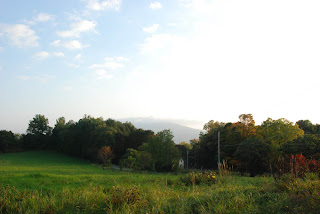 This morning my friend Karen sent me a pointer to another blogger she knows who was asking questions about wisdom. The questions seemed connected, both with the thoughts in my last two blogs about good and evil, and also with my Thomas reading this morning, which suggested that both good and evil flow from within, from the human heart, not from external sources.
This morning my friend Karen sent me a pointer to another blogger she knows who was asking questions about wisdom. The questions seemed connected, both with the thoughts in my last two blogs about good and evil, and also with my Thomas reading this morning, which suggested that both good and evil flow from within, from the human heart, not from external sources. The blogger had heard this said about wisdom: "Wisdom made Qoheleth miserable. Why? Because it revealed that so much in life was beyond human repair." And she wondered what our reactions were to that. The comments in response seemed to stay largely in that space, the space where we know there is so much pain and suffering in the world, even for the "good" people, the undeserving ones, and we have to wonder where God's purpose might be in that.
But Karen (wisely) saw that there was more to wisdom than that space. She referred to a chapter in Matthew Fox's book, Original Blessing, entitled "Letting Pain be Pain," and suggested in closing that "I would ask the kindest, most patient people you know…usually, they have suffered, and they have simple, earthy, wisdom. I think it often looks like LOVE."
Which made me think of a couple of the poems I read in Daniel Ladinsky's wonderful book, "Love Poems from God."
The poet Rabia, in a poem called "It Acts Like Love," says this:
"My body is covered with wounds this world made, but I still longed to kiss Him, even when God said, "Could you also kiss the hand that caused each scar, for you will not find me until you do."
And St. Teresa of Avila says this: "Life smooths us, rounds, perfects, as does the river the stone, and there is no place our Beloved is not flowing, though the current's force you may not always like...I loved what I could love until I held Him, for then --all things -- every world disappeared."
To me, what these poems say is that it's really not about the pain and suffering and the brokenness that we experience; it's about seeing beyond that to the love that binds all together. I’ve always thought the scariest and probably most important prayer is “not my will but thine be done.” As a born and bred Presbyterian, I have this innate sense that even if I DO get carried away by my own stuff and ignore God’s will that God’s will is somehow in that as well, but beyond that complexity and confusion is this sense that my job is always to listen for God’s will.
It may well be that I listen out of some vain hope that if I listen God won’t smite me with the various horrors of the world, rather like trying to be humble in hopes of someday being exalted. But I’m hoping that over time it will be more about listening because that’s how I stay in relationship with God. That relationship, in the end, gives me whatever that thing is that helps me keep going. And I don’t name that thing because I think it varies with time and experience, and that only God knows what is needed to put in that place. Sometimes hope, sometimes love, sometimes compassion, sometimes doubt and confusion, sometimes even a deep well of apparently bottomless sorrow. My job is to walk into it, to feel it, to learn what needs to be learned, and to listen for “the still small voice.”
It feels to me that the problem with Qoheleth's search for wisdom is that the search comes out of his desire to be like God; a desire that has gotten us into trouble right from the beginning of human time. In fact I think any time we seek "the knowledge of God's will" we are pretty much going to get into trouble. Because however close we may feel to God at times, however much we may be aware of that spark of God that lies within us, the paradox that lies in the wisdom phrase "there is nothing that is not God" is really that we are not God.
To me, wisdom -- the human variety, that is -- may be more about the humility of that paradox. If I think of the wise people I know, I see that they understand that none of us is protected from or immune to that break in the arm, the car accident, the cancer, the suicide of a child. Dreadful things happen to good people as well as bad, so how do we deal with that?
If wisdom comes from such trauma, perhaps it is a wisdom that says more about compassion and humility than about knowledge. What we learn at such times is that everything we thought we knew may have been wrong; everything we thought was safe was not. In wisdom we watch with tenderness our own desperate efforts to protect our hearts; we watch with compassion as others struggle with great pain; we see at last that we are not alone, that this undercurrent of fear and pain is, in fact, universal.
And then I think of the Buddhist practice of Tonglen, about which I began reading just last night: When we breathe in, we breathe in the sorrows and the pain and the suffering, and feel them, not just our own, but sensing how our own are replicated in so many other lives. Taking that, we drop into the clear well of being that connection to humanity and God can bring, and then we breathe out compassion and tenderness for all whose lives are linked with ours.
So why do I put this photo at the top of this blog? Why do I even take photos like this one? I think it is my attempt to express that clear well of being, to do my part to breathe out compassion, faith, deep water joy into a troubled world. Bahauddin, in The Drowned Book, says this:
"Your conscious being, with what you've been given, should be like a beautifully laid-out park with wildflowers and cultivated wonders, a swift stream with secluded places to sit and rest beside it. When a grieving person sees you, he or she should recognize a refuge, refreshment, a generous house where one need not bring bread and cheese. There will be plenty."
I'm not there yet, as a person. but I think that sometimes my camera may be.














